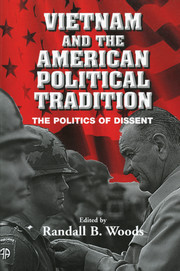Book contents
- Frontmatter
- Contents
- List of Contributors
- Introduction
- Anti-Imperialism in U.S. Foreign Relations
- World War II, Congress, and the Roots of Postwar American Foreign Policy
- The Progressive Dissent: Ernest Gruening and Vietnam
- “Come Home, America”: The Story of George McGovern
- Congress Must Draw the Line: Senator Frank Church and the Opposition to the Vietnam War and the Imperial Presidency
- Dixie's Dove: J. William Fulbright, the Vietnam War, and the American South
- Advice and Dissent: Mike Mansfield and the Vietnam War
- The Reluctant “Volunteer”: The Origins of Senator Albert A. Gore's Opposition to the Vietnam War
- A Delicate Balance: John Sherman Cooper and the Republican Opposition to the Vietnam War
- Friendly Fire: Lyndon Johnson and the Challenge to Containment
- Richard Nixon, Congress, and the War in Vietnam, 1969–1974
- Index
Congress Must Draw the Line: Senator Frank Church and the Opposition to the Vietnam War and the Imperial Presidency
Senator Frank Church and Opposition to the Vietnam War and the Imperial Presidency
Published online by Cambridge University Press: 21 November 2009
- Frontmatter
- Contents
- List of Contributors
- Introduction
- Anti-Imperialism in U.S. Foreign Relations
- World War II, Congress, and the Roots of Postwar American Foreign Policy
- The Progressive Dissent: Ernest Gruening and Vietnam
- “Come Home, America”: The Story of George McGovern
- Congress Must Draw the Line: Senator Frank Church and the Opposition to the Vietnam War and the Imperial Presidency
- Dixie's Dove: J. William Fulbright, the Vietnam War, and the American South
- Advice and Dissent: Mike Mansfield and the Vietnam War
- The Reluctant “Volunteer”: The Origins of Senator Albert A. Gore's Opposition to the Vietnam War
- A Delicate Balance: John Sherman Cooper and the Republican Opposition to the Vietnam War
- Friendly Fire: Lyndon Johnson and the Challenge to Containment
- Richard Nixon, Congress, and the War in Vietnam, 1969–1974
- Index
Summary
The career of Senator Frank Church (D-ID) provides a unique perspective for understanding the development of opposition to the Vietnam War and the anti-imperialist position during the 1960s and 1970s. From his first speech in February, 1965, criticizing Operation Rolling Thunder and United States policy in Vietnam to his opposition to the Ford administration's efforts to prevent the final fall of the Saigon government in 1975, no senator had a longer career of opposition to the Vietnam War or a greater impact on American foreign policy than Frank Church. His early opposition to the war in Vietnam helped to provide legitimacy to the then struggling antiwar movement and marked the beginning of a decade-long struggle with the Executive branch concerning the constitutional balance of power and the nature of American foreign policy. Central to Church's critique was his conviction that the American obsession with communism led to an interventionist foreign policy that was damaging to the national interest. In order to change this policy, Church sought to reintroduce to the making of American foreign policy the principles and ideals of the nation, and restore the Senate's constitutional role. Church believed that the United States needed to be willing to accept change in the world and have faith in its own institutions and values as guides to diplomacy.
First elected to the Senate from Idaho in 1956, Church quickly rose in prominence in the Democratic Party.
- Type
- Chapter
- Information
- Vietnam and the American Political TraditionThe Politics of Dissent, pp. 121 - 148Publisher: Cambridge University PressPrint publication year: 2003



